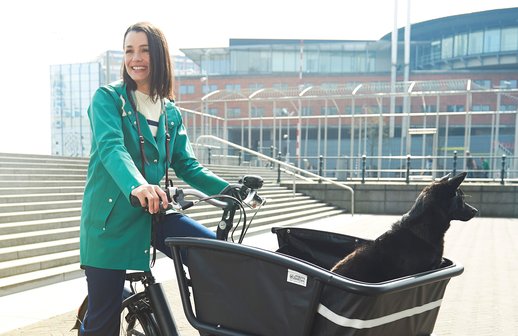Seven questions for researcher and teacher Meredith Glaser
Meredith Glaser is an urban planning researcher and lecturer, originally from the US. Since 2010 she lives in the Netherlands. Her PhD research focuses on knowledge transfer and capacity building for sustainable transport governance. In this article you can read more about her personal bike experiences and point of views from her research that are interesting to learn from.
Who is Meredith Glaser?
Meredith co-founded the summer programme Planning the Cycling City with the ‘Dutch Bike Pro’ Dr. Marco te Brommelströet. She also manages academic outputs for several European Commission and international research projects.
I was born and raised on the California coast, but have been living in the Netherlands since 2010. I am currently a researcher and lecturer at the Urban Cycling Institute, at the University of Amsterdam. Meredith holds Masters degrees in city planning and public health from University of California, Berkeley. I find cycling a valuable and fascinating way to combine these fields.

Why did you move to Amsterdam?
I’ve traveled quite a lot in my life and lived in rural Japan and Palau, east of the Philippines. So I value that immersive experience into another culture, meeting new people and experiencing new norms. Before moving to the Netherlands, I already visited your country several times. I was drawn to what seemed like a high quality of life, a culture with an open mindset, and an incredible appreciation for public life, public space, and urban design.
How does cycling influence your daily life?
As a family of four, with no car, our bicycles – all six of them, plus two spares! – are essential for bringing us wherever we go. In one sense, the bicycle is a simple tool to get from A to B. It’s like any trusty appliance. But it’s much more. It also provides me independence. I can come and go as I please, feel the fresh air (or rain!), and stop at my favorite shop at a moment’s notice. At the same time, I feel part of the community. Even riding next to strangers, you pedal together, everyone sharing energy. And none of this is really obvious; it’s just part of the mundane daily rhythm. But the way we travel, is also important in the way we feel us connected to others. We have researched this in we pedal together.
Can you tell us about the Urban Cycling Institute?
The Urban Cycling Institute is a small multidisciplinary team of social science researchers at the University of Amsterdam. We use the bicycle as a boundary object to explore urban phenomena. In other words, we use the lens of transport and bicycling to study complex topics like innovation and policy change. Our research often is part of larger scientific or EU programs. In that way, we also work together with local governments to facilitate a feedback loop between science and practice. It’s not a coincidence that we are situated in Amsterdam, a city well-known for its very high cycling rates. Because of this history of experience with bicycling policy, we think the Netherlands is in a unique position. With an obligation to share this knowledge and practice with the world. So our mission is to offer academic rigor, also through teaching, but also practical knowledge. We use the city as a playing board to explore these issues head on.
And what about your own research?
I study how ideas, knowledge and policies about bicycling are picked up. Not only how they move around from place to place, but how that knowledge is used to work towards sustainable mobility goals. As global societal challenges become more urgent, like climate change and public health, cycling is increasingly on the political agenda as a potential solution to address many issues. The problem is: how to do it? One line of investigation in my research centers on how The Netherlands is sought after as a role model because so many of its cities have reached high levels of cycling. Even though policy makers and transport professionals have been coming to Amsterdam for decades to learn all the tips and tricks, only now there was opportunity to better study and document the impact of this learning in research reports. Now we can better understand what drives knowledge transfer for how transport systems could evolve.
Do you have any conclusions that would be interesting to share?
The first conclusion might be obvious but also unique for transport policy: It turns out, learning from the Dutch means ‘getting on the saddle’ that was the conclusion of our survey. For the Dutch, this is not special. But for those from car-dominant environments, which is much of the world, this experience is unique. Many of the decision makers in my studies had not ridden a bicycle since they were a child. Before arriving, some admitted some anxiety about what riding would be like and how it would feel. This shows how truly inconceivable it was to relate to an environment, or a lifestyle, where bicycling was the norm. After six till twelve months, these very personal memories, a form of tacit knowledge, could be vividly and fondly recollected and shared.
The other interesting conclusion connected to this, was the social learning impact. What stood out was not only the bicycling, but who else from their city was there with them. It was an important opportunity to build a level of familiarity and trust among colleagues that the workplace simply does not afford. For many, the experience brought a new level of confidence, both in the policy direction to improve bicycling in their city but also in their collective ability to continue the very hard work that is change.
If you can share one lesson about cycling in Amsterdam, what do you want to pass on to our community?
Amsterdam has certainly set an example for the rest of the world. By devoting public space to safely allow different types of modes (like car, bike, public transport and walking) to flourish can create a totally different mobility narrative. A window of opportunity has seemed to open with COVID-induced street transformations. But if we’re talking about transferring knowledge from the Netherlands to other places, I think it’s important to recognize that the lessons learned will always depend on who you’re talking to. Just as there was no silver bullet for the Dutch, but rather a perfect storm of events, there is no single solution. Even if the end goal is one in the same, every city is truly unique. Every city has different rules and regulations, different stakeholders, and therefore wildly different pathways. What’s exciting is the potential to unlock that knowledge, to co-create local innovation. So we can see what the bicycle – this simple tool – can inspire to create a better functioning city.







